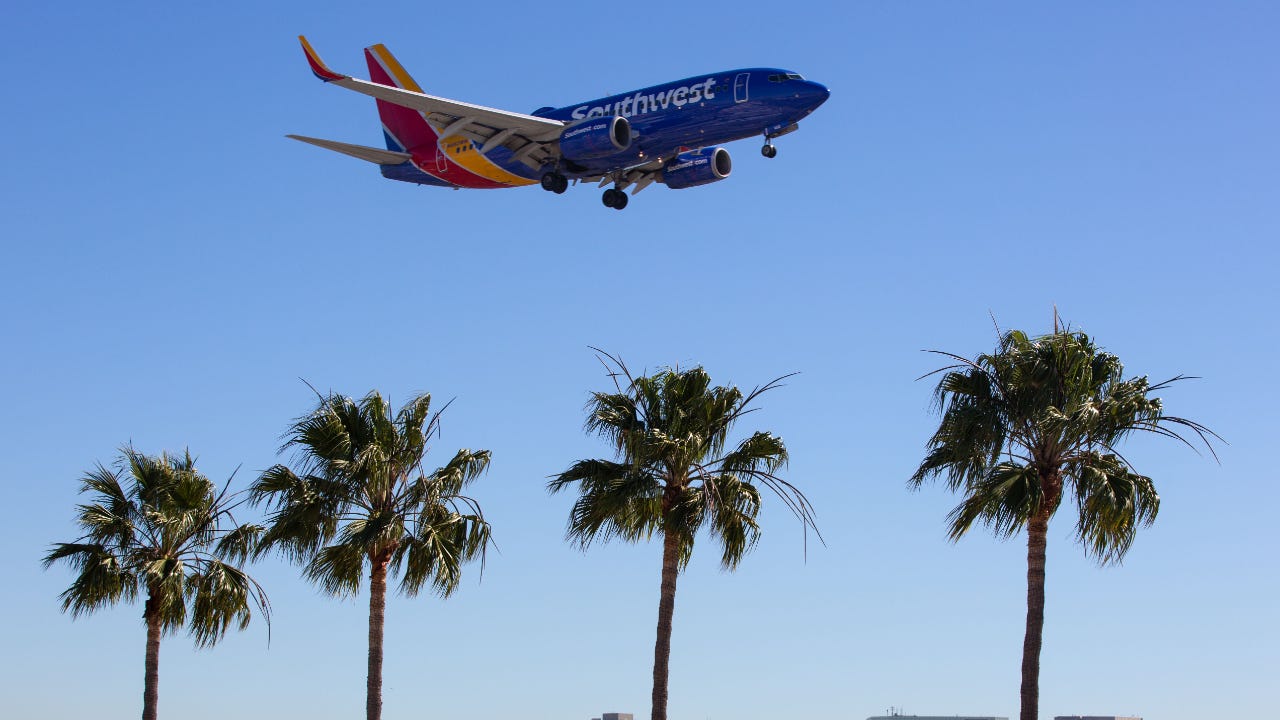Travel stocks: Ready for a ‘revenge’ rebound or stymied by sky-high inflation?

Americans are itching to travel again, after two years of COVID, lockdowns, semi-lockdowns and masking mandates have discouraged, if not outright stopped, seeing the world. While many travel stocks bounced off their pandemic-era lows, the actual businesses have yet to follow suit.
Some companies are still mired in the pandemic’s fallout: consumers with little money, supply chains that remain snarled, lingering fears of the virus itself and the highest inflation in 40 years.
Besides those core issues, there’s always the potential for more fallout from a new wave of COVID or an escalation of international conflicts. With many travel stocks off their recent highs – and plenty that have never fully recovered – is it a good time for investors to find value here? Or should investors wade more cautiously into the sector?
Are travel stocks a good bet for a rebound in 2022?
Travel is one of the most sensitive areas of the economy. When money gets tight, it’s one of the easiest areas for consumers to cut back on, making it a highly cyclical industry. If consumers get anxious about the economy, inflation or any number of other things, travel can be quickly cut.
So after two years of sluggish activity in the travel sector, is 2022 the year that it finally bounces back? While many travel stocks are off their lows, they’re still well below their levels of 2019.
“As COVID-related restrictions continue to ease, travel stocks will be free from the impact these had on both their business and their stock prices,” says Julie Gillespie, head of TipRanks TV. “There is renewed optimism for future travel, with plenty of pent-up travel demand in store.”
“Travel stocks rebounded to recent highs during the recovery of the last year, yes, but historic highs occurred prior to the pandemic, and for many brands, there is room to double and still not reach those share prices,” says James Ferrara, president and co-founder of InteleTravel, a travel advisory firm.
But the emergence of the rapidly spreading Omicron variant of COVID and now global events such as the Russia-Ukraine conflict, with its potential to escalate, have given some travelers pause. And with consumers feeling the bite of inflation – now at its highest level in decades – it may not seem like travel companies are poised to do particularly well going forward.
Inflation is hitting areas that are particularly important for the travel industry: food, fuel and labor. Labor costs have been a notable factor, rising markedly as many companies seem unable to find workers, at least at prices they’re willing to pay. And oil prices now sit at multi-year highs, hitting industries such as airlines and cruise lines hard, though it also hurts the prices of other goods and services. Food prices are hit by both these factors, particularly restaurant food.
However, it’s important to remember that the stock market typically looks out six to nine months. It’s pricing events into stocks based on how they might be impacted by emerging events. That means low stock prices today might quickly turn if a few conditions conspire to get travel booming again. It’s certainly clear that at the end of the day consumers still want to travel.
And the travel sector didn’t just sit on its thumbs the last two years after travel stocks were knocked off their strong upward trend. Top companies used the downturn to get lean and mean, and profits could rebound strongly when demand returns in full force.
“The best companies took the last two years to trim expenses, develop technology and hone their brands,” says Ferrara. “They can be even better positioned to resume that trend in the coming year, if not escalate it.”
Despite ongoing worries of the pandemic and international conflict, which could hamper short-term results, “if you look further out, this could be a buying opportunity,” says Anthony Denier, CEO of trading platform Webull.
Ferrara seems to agree: “A travel surge is imminent this year and into 2023, which will amplify the pre-pandemic growth trends and industry outlook for the rest of the decade.”
And he doesn’t see inflation rearing its head too much in the travel industry yet. “More influential is the pent-up demand and unspent travel dollars of the last two years,” Ferrara says.
5 things to watch in travel stocks
Here are five areas to be aware of if you’re looking at travel stocks as a potential investing opportunity.
1. Not all travel stocks are the same
Dynamics in the marketplace differ from sub-sector to sub-sector. While airlines, hotels and online booking sites might all be part of the travel economy, they each respond in different ways to the events playing out. That might be oil prices, travel restrictions or international conflict.
It’s critical to remember that the travel sector consists of many different business models. If Americans are staying in the U.S. to travel, domestic hotels might do quite well while airlines that rely heavily on transatlantic flights to generate their profits may fare quite poorly.
The swings in demand, whether it’s consumers or governments driving the decisions, can have nasty effects. Many sub-sectors of the travel industry are not well-suited to these swings. Airlines have to run their routes whether the planes are full or empty, while hotels have to support high fixed costs to keep their properties orderly whether guests show up or not.
If you’re investing in individual stocks, make sure to understand the dynamics at play in that sub-sector, since not all travel stocks are the same. For example, while Delta Air Lines and Carnival sit well below their 2019 peaks, booking site Expedia recently powered to new highs.
2. Look to luxury
Those with the most disposable income tend to be the first to start spending it, especially on highly discretionary purchases such as travel. So, companies that tend to cater more to the affluent may see business rebound in a way that’s faster and more resilient than other kinds of companies.
“Across the industry, we’re seeing that luxury travelers are one cohort leading the travel industry’s recovery,” says Colin Smyth, vice president and general manager of travel at Flywire, a payments firm for the travel industry. “In recent earnings calls, executives from Wynn Resorts and Marriott point to their premium travelers and high-end properties as top performers.”
Smyth points to a Flywire report that revealed that 72 percent of luxury travelers will drop more money on vacations in 2022 than they did before the pandemic began.
Investors interested in travel stocks may consider investing in companies exposed to these wealthy consumers, who may spend on a more sustained basis even if further roadblocks arise.
3. Shifting loyalties
With some of their traditional vacation spots off-limits, consumers may have developed new tastes, and that could potentially lead to longer-term shifts in demand.
Ferrara points to the cruise industry, where there’s been “a dramatic market share shift to land-based vacations, particularly all-inclusive resorts in the Caribbean and Mexico. Cruise sales declined as much as 80 percent in 2020 and 2021, while vacation package sales doubled.”
“The cruise industry will be fully operational this summer – essentially all ships, all ports,” says Ferrara. “But millions of customers have experienced new resorts and destinations, and there will be new loyalty from that.”
Ferrara highlights non-hotel lodging companies such as AirBnB as potential winners in this shift as consumers looked for private accommodation during the pandemic. “As a result, the rate of growth and market share in this vertical has been boosted for the long term now,” he says.
Identifying companies that can take advantage of these shifting loyalties could be a good way to spot a future winning investment.
4. Geopolitical conflict
Escalating tensions around the world, notably the Russia-Ukraine conflict, have the potential to shake the travel industry, both directly and indirectly.
“Geopolitical tensions are very high and certainly weighing on the markets, and dampening enthusiasm for European travel,” says Gillespie. “This will be a hindrance to travel stocks that have a large presence in the European markets.”
Global conflict dents would-be travelers’ confidence, but it can also raise the price of oil, which has now soared to more than $100 per barrel. That price rise has knock-on effects throughout the economy, raising prices everywhere and reducing consumers’ disposable income. Further escalations or even a new conflict could rapidly hurt the travel industry.
But David Sadkin, president of Bel Air Investment Advisors in Los Angeles, thinks the investing climate will be a more prominent factor in stocks’ returns: “Fed interest rate policy is likely to be far more influential on the financial markets than geopolitical events.”
5. Stocks that have yet to fully recover
If you’re looking for potential upside, one place is to search for underperforming stocks where the earnings power of the underlying companies is poised to rebound.
Ferrara likes the cruise industry, which includes companies such as Carnival, Royal Caribbean and Norwegian Cruise Line Holdings.
“The fundamentals are there: many new ships are being launched, demand is strong with extraordinarily high satisfaction and repeat bookings, and the value and quality of the product are very high,” he says. “Stock prices do not yet reflect this.”
Other travel stocks have already seen stronger performance over the last year and may be less attractive.
“Looking at hotel-related companies, some companies such as Marriott International, Hilton Worldwide, and Hyatt Hotels have seen very positive growth so far in 2022, leaving smaller upside potential,” says Gillespie.
However, even if demand does return, a company’s profitability may still be challenged by rising costs. Companies that have pared back costs might find that they’re paying their existing staff more and may need to hire more, while fighting rising costs elsewhere, such as fuel. In such cases, profits are likely to return, but may not return to where they were, at least for a while.
Bottom line
With consumers just aching to start vacationing again, it seems like the travel industry is poised to rebound, though a number of other factors such as new COVID variants might slow that roll. Still, some parts of the travel industry may have yet to price in a recovery, and so could be attractive investment opportunities. But it’s worth remembering that it takes substantial work and analysis to pick the winning investments from the losers.
If you’re not comfortable doing that, it’s easy to turn to broad-based index funds and ride the growth in the entire economy, without having to find the winners.
Learn more:
- How to invest in stocks: A step-by-step guide for beginners
- The pros and cons of travel credit cards
- 5 best investments to hedge against inflation
Editorial Disclaimer: All investors are advised to conduct their own independent research into investment strategies before making an investment decision. In addition, investors are advised that past investment product performance is no guarantee of future price appreciation.






